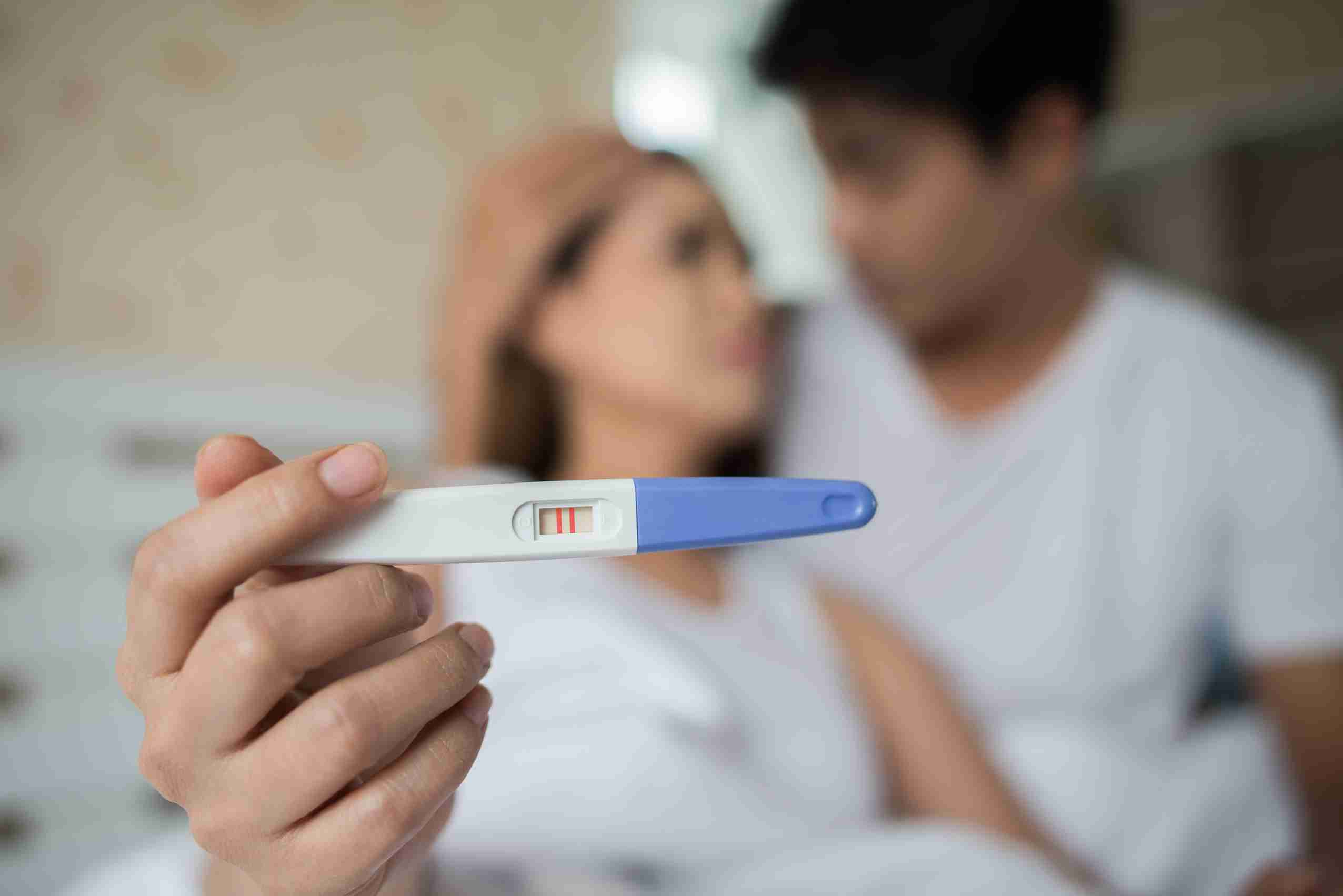
Our bodies produce various hormones, and they all need to maintain a delicate balance for the body to function properly. AMH is an important hormone that can indicate a woman’s fertility. However, high AMH levels may not be good news. It can even indicate PCOS, a common hormonal imbalance that can interfere with fertility. Read on to know more about high AMH levels and PCOS and how they can affect a woman’s chances of pregnancy.

AMH stands for Anti-Müllerian Hormone. AMH is produced by both males and females. In females, the ovaries, and in males, the testes produce this hormone. The AMH is an important hormone in determining the sex of the developing fetus.
Females are born with a fixed ovarian reserve (eggs in the ovaries). The AMH indicates this ovarian reserve. When a female has high levels of AMH, it indicates that she has a large ovarian reserve or a large number of eggs. The AMH declines with age, indicating a decline in fertility or ovarian reserve.
In males, the AMH is responsible for the development of male sex organs and for suppressing the development of female sex organs.
Polycystic Ovarian Syndrome is a hormonal imbalance in a woman’s body. PCOS causes an increase in the androgens – male hormones, in a woman’s body, irregular periods, and in some cases, it even causes cysts on the ovaries.
PCOS interferes with the release of mature eggs every menstrual cycle. As a result, it can cause a delay or a complete lack of ovulation. When the egg release is delayed, it is a delay in ovulation; when the egg is not released, it is anovulation – a lack of ovulation.
Both these issues can cause fertility issues or even infertility. Without a mature egg, fertilisation is not possible. Lifestyle changes and fertility drugs can help stimulate the ovaries to release mature eggs. PCOS need not be a permanent roadblock to one’s fertility.

PCOS indicates the presence of many eggs in the follicular stage – the stage before maturation. These eggs need to mature before being released for successful fertilisation. The higher the number of eggs in this follicular stage, the higher the AMH levels will be. However, in PCOS, the eggs are never released or are released too early. When the egg is not mature, a sperm cannot fertilise it, thus preventing pregnancy.
So, do elevated levels of AMH cause PCOS? No. High levels of AMH are only an indication that one could be suffering from PCOS. Elevated levels of AMH are generally observed in women with PCOS. Hence, not all women with elevated levels of AMH suffer from PCOS. The chances are just high. Similarly, not all women with PCOS have high levels of AMH, but it is just one of the many symptoms of PCOS.
Now, let’s dig deeper to understand how high levels of AMH and PCOS affect a woman’s ovulation and fertility.
As mentioned earlier, PCOS is a hormonal imbalance that causes the ovaries to either release eggs before they mature or not release them at all. Ovulation is the release of a mature egg from the follicles. When a mature egg meets a sperm, fertilisation can occur, leading to pregnancy.
PCOS can delay ovulation, leading to irregular periods or anovulation. Anovulation is when there is no ovulation, meaning no mature egg is released for fertilisation. When there is no ovulation, there is no menstrual period. Some women may experience bleeding despite anovulation. This is known as abnormal uterine bleeding and is not their period.
If the egg is immature or absent when the sperm travels up the fallopian tube, fertilisation does not occur. This causes a delay in conception or infertility. The AMH levels do not influence ovulation in any way. PCOS is a hormonal imbalance that can interfere with ovulation.

It is still possible to conceive despite high levels of AMH and PCOS. A few lifestyle changes can help bring PCOS under control. This, in turn, can decrease AMH levels, as the number of eggs in the follicular stage will start to decrease.
Fertility drugs can stimulate the ovaries to release mature eggs for fertilisation. One can even opt for IVF or other assisted reproductive technologies to help them conceive despite their PCOS. In some rare cases, the doctor might surgically remove the ovarian tissue producing the androgen hormones. With timely treatment and assistance, women with elevated levels of AMH and PCOS can get pregnant and also enjoy a healthy pregnancy.
● Each individual’s body is different. Your body’s reaction to the fertility drugs and treatment can vary from that of others.
● Consult your fertility specialist and identify the best course of action for your needs rather than going with a choice someone else made for their body.
● Infertility or delay in conception can happen due to various reasons. It is important to rule out other possibilities before you start taking fertility drugs or treatment.
● Constant monitoring of the menstrual cycle and ovulation is essential for conception. You can track your basal body temperature, use ovulation kits, or note changes in your cervical mucus to narrow down your ovulation period.
● Getting help to conceive, in the form of fertility drugs or treatments, is nothing to be ashamed of.
● Most women with PCOS and elevated AMH need multiple attempts to conceive. It is very normal.
If you are diagnosed with PCOS and have elevated AMH levels, you can try the following to reduce AMH:
● Losing weight can improve your body’s insulin sensitivity, which can reduce androgen production and improve ovarian function. Remember, losing too much weight too quickly can also lead to irregular ovulation.
● Consult a dietitian and start following a well-balanced diet. Focus on increasing protein intake and decreasing carbohydrate intake.
● Regular physical activity and mild exercises can help improve blood circulation throughout the body, including the ovaries. This, in turn, can control AMH levels and improve ovulation.
● Stress can have a direct impact on one’s fertility and pregnancy outcomes. Practice stress management techniques like meditation, art, or take up a hobby to help you relax.
● Medications and supplements can help improve insulin resistance, which can indirectly improve ovarian function and reduce AMH levels.
You may take more time than others to lower your AMH levels. You may require more attempts before you can successfully conceive. Remember, each body is different and can react differently to drugs and treatments.

When determining a woman’s egg reserve, the AMH is a crucial indicator. However, it can also indicate PCOS, which is one of the common causes of fertility issues. With a few lifestyle changes and proper medical guidance from a well-qualified gynaecologist or fertility expert, pregnancy is still possible despite high AMH levels and PCOS.

AMH stands for Anti-Müllerian Hormone. The AMH indicates a woman’s egg reserve. The follicles in the ovaries produce this hormone. So, the more the number of follicles, the more the production of AMH. High levels of AMH indicate a large ovarian reserve.

High levels of AMH in a woman’s body indicate a larger egg reserve, meaning she is very fertile and can conceive. However, these high levels can interfere with normal follicular development, causing the ovaries to release eggs prematurely or not release any at all. AMH levels rise when eggs are in the follicular stage. In the case of PCOS, these eggs don’t develop further and may be released too early or not at all, resulting in anovulation

Yes, natural conception with PCOS and high AMH levels is possible, but it will be very challenging. The lack of ovulation or irregular ovulation due to high AMH levels makes it challenging to track the optimal dates for intercourse. Lifestyle changes can help regularise the menstrual cycle, and ovulation kits can help track the precise time of ovulation.

PCOS is a hormonal imbalance that makes natural conception very challenging. While high AMH levels can indicate a large ovarian reserve, meaning there are many eggs in the follicular stage ready for fertilisation, it can also indicate PCOS. In the case of PCOS, the eggs may not mature properly, resulting in anovulation – no ovulation or premature release of the eggs, which cannot be fertilised by a sperm. So, high AMH levels can have different outcomes for different women.